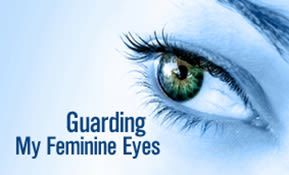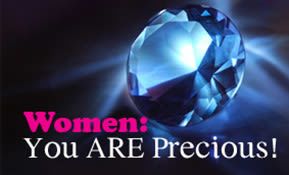
Daughter of the King
Many think that religious people are conformists because of their modest dress; but aren't the slaves to the "latest styles" the real conformists?

Jewish modesty – it has all sorts of connotations, assumptions and misconceptions for the Jewish woman. So before we look at some of the issues relating to the Torah’s concept of modest attire, let’s look into the Torah to see where the root of modesty and clothing first appears.
Before sin of the Tree of Knowledge of Good and Evil, Adam and Chava [the original Man and Woman] never wore clothes. Why? The mystical sources describe their essence as being a spiritual light with the only the outline of a body. They only had awareness of themselves as spiritual, not physical, beings. Hashem created their very bodies as garments for their souls; therefore, they didn’t need clothes. The Torah says, “They were both naked, the man and his wife, and they were not ashamed.”
After the sin, Adam and Chava crashed the world into a much more physical existence and, as a consequence of this catastrophic event, they too became more physical. The skin became coarser and now hid the soul rather than reveal it; the body had now become more dominant than the soul. Adam and Chava made aprons of fig leaves to cover their nakedness, thereby making the body something distinctive, something separate to the soul. Hashem calls out to Man, “Where are you?” And Man replies,” I heard the  sound of You [Hashem] in the Garden, and I was afraid because I am naked, so I hid.” [Genesis] The trait of shame had come into existence and, because of Adam and Chava’s attempts to cover themselves, Hashem responds in kind and makes garments of skin for both of them. The world of fashion had been born!
sound of You [Hashem] in the Garden, and I was afraid because I am naked, so I hid.” [Genesis] The trait of shame had come into existence and, because of Adam and Chava’s attempts to cover themselves, Hashem responds in kind and makes garments of skin for both of them. The world of fashion had been born!
The rectification of this spiritual fall is the Torah’s laws on modesty, the purpose of which is to de-emphasize the externality (chitzoniut) of the body and enhance the internality (pnimiut) of the soul as it was before Man’s sin.
Interestingly, one area of the body we specifically do not cover is the face. The face reveals our uniqueness; it reveals our very vitality, our personality, our wisdom, specifically through the eyes, hence the expression the eyes are the windows to the soul. It also reveals a residue of the spiritual glow that Original Man had. Think about it, you can only really identify a person by their face, not their body. The Hebrew word for face is panim – it’s always referred to in its plural form, because there are two aspects to our face, inner and outer. The same root word for face, panim, is also pnim, internal. So what does this teach us? That the internal should reflect the external and vice versa; we should strive for harmony between our inner and outer selves.
Before I led a Torah life, I used to see religious Jews and feel a bit put off by the “uniform”; it seemed to me that it created an imaginary wall between them and us. I mean, why did they have to dress like that? Except what I couldn’t internalize at that stage in my life was that I was relating to them as the other, separate to me, instead of seeing them as part of me, as all Jews are considered one soul. As I got to know the others, I saw each Jew’s unique individuality and, after a short period of time, didn’t even notice what they were wearing.
It’s funny, but the secular world thinks religious Jews are conforming if they wear more modest clothing and that secular people are the ones expressing their individuality by dressing in the latest styles. But who is the real conformist? Surely someone who wears clothes just because a fashion designer says so is the real conformist, because it’s conforming without any inner wisdom or any higher purpose. We can either be slaves to other people’s ideologies or a servant of Hashem, but not both.
I’ve met many modestly, elegantly dressed religious women and it seems to bring out their inner dimensions, talents, personalities in a much more vibrant way. [Modest dress does not mean a woman has to dress uncreatively – I definitely have a style of dress, a color scheme, which is a reflection of my personality]
Sometimes I hear women say that they feel inauthentic if they dress in a more modest way, that “it’s not them”. Actually, I believe it’s the other way round. I remember after I started dressing modestly, something happened in my life that caused me to yearn for a less modest way of dressing. I knew it was just an emotional reaction, but I developed an insatiable desire to own a pair of trousers again. So I went on a mega search for the perfect, modest, trousers. After trying every shop I could think of and having tried on many pairs of quite immodest trousers, I settled on a suitable pair of trousers. I knew deep down I wouldn’t keep them but my Evil Inclination was on the loose and there was no stopping it. I wore them exactly 3 times before they went to the charity shop.
The interesting thing about this experience was that I discovered the real, authentic me; and the real, authentic me, didn’t feel comfortable in trousers anymore. I also didn’t want to look like everyone else because by dressing like everyone else, I couldn’t aspire to be a light unto the nations, let alone serve Hashem.
So I discovered my higher, truer self, the self that wouldn’t betray Hashem, the self that was a bat Melech, a daughter of the King.








10/01/2013
Skirts Ok daughter of the King; so an elder females who responded there's torah on skirt lenght; also used Kate Middleton as an example, her skirts are above knee??? and she's royalty. So much for Royal daughters.
10/01/2013
Ok daughter of the King; so an elder females who responded there's torah on skirt lenght; also used Kate Middleton as an example, her skirts are above knee??? and she's royalty. So much for Royal daughters.
10/01/2013
Modesty Ok so English word modest(ly) is very non descript. It had no boundaries; it could mean many things to many people. Who makes the definition and I get based on what; but you know it's still foggy and seems to leave a lot of room for error. What would the Hebrew word be? Was it every used in the TanaK? Where? Someone once responded to me there is no Torah for skirt length. I was shocked at the response to my complaint the skirts on the women were getting too short? Above knee tight.